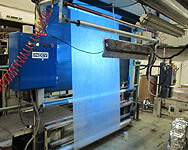Need Custom Converting? Your Options and What They Offer You

Typically, there are two options from which you can choose: contract manufacturing and toll processing. Tolling and contract manufacturing offer various advantages and disadvantages. Although, both can potentially work for small business owners. Some service providers give clients a choice, offering both toll processing and contract manufacturing. However, we recommend considering each option carefully before making a final decision. As all small business owners likely know at this point, time is of the essence.
With that in mind, let’s explore the differences between tolling and contract manufacturing. Likewise, we’ll review how you’ll get the most out of custom converting. The more educated you are on these processes, the easier it will be for you to know which one is right for your business.
What is The Difference Between Contract Manufacturing and Tolling?
First, let’s explore the basics behind contract manufacturing and toll process or toll manufacturing. Both are essentially a form of third-party manufacturing. Rather than handling your manufacturing in house, you will pay the third party for a service and receive your goods in return. However, there are some key differences between the processes. This ensures that you’ll have a different experience with each one.
A contract manufacturer will always have its own facilities, whether that is a plant or a laboratory. From the beginning of the process to the end, everything will take place in those facilities. All these activities occur under the supervision of the contract manufacturer. This means that you will not procure any of the raw materials for the contract manufacturer. These materials will be a part of your contract, and supplied by the third party. For some small business owners, this is a practical and financial relief. Procuring the raw materials necessary early in your business’s lifetime can be difficult. If you’re working with a trustworthy and reliable contract manufacturer, they may have connections and resources that you currently don’t.
On the other hand, some business owners prefer more control over the process, and would rather procure the raw materials themselves. In this case, you may consider tolling instead for your custom converting needs. Toll manufacturers will handle the manufacturing process, but receive both the raw materials and the design plans from the client. This means more work for you, but more control as well.
In both cases, you can save time and money through outsourcing. One process simply allows you a greater degree of involvement.
Should I Choose Contract Manufacturing or Tolling for Custom Converting?
Ultimately, the decision is yours alone. You should be very comfortable with the company you choose regardless. Due to the lack of control involved in contract manufacturing, however, that confidence becomes even more crucial. You won’t be able to step in with a contract manufacturer and control the pricing and quality of the materials used. Nor will you be able to make suggestions about the design process. Some contract manufacturers offer cheaper services than tolling manufacturers. However, that doesn’t mean that they’re what you want to work with. Cheaper doesn’t always mean better.
Often, inexperienced contract manufacturers achieve this price cut by acquiring cheaper, inferior raw materials. You may pay less initially, but will pay more in the long term. For instance, when you need to order an additional, corrected product run, that’s time consuming and costly. It’s easier for you to know exactly what you’re getting when you select your own materials. If you do work with a contract manufacturer, it’s important they have years of experience. Similarly, they should have testimonials from satisfied clients and total transparency with you.
What Should I Look for In A Provider?
Let’s delve into how you can further vet custom converting service providers. If you’re working with CTI, for example, you know outright that we have well-documented years of experience, as well as reviews and recommendations to which you may refer. Additionally, you’re able to work through our consultation process ahead of time, which gives you even further input. We want our clients to know exactly what they’re getting, from the machinery used to the facilities wherein manufacturing takes place.
During the course of our process, you’ll be able to go through the formulas we’re considering and the design plans. Our initial consultation allows us to get an understanding of what you want and whether or not we’re the right company to fulfill your needs. The subsequent research and development phase solidifies plans, though you’ll still have lab samples to approve before we move forward. Even after that, you’ll still have a pilot run, over which you can give final approval before we move into full production.
While we can’t tell you whether contract manufacturing or tolling is the better solution for your custom converting needs, we do know what we can offer, and we’ll happily discuss it further with you over an initial consultation. Give us a call at 419-924-5566. It’s incredibly important that you know what you’re getting when working with a custom manufacturer. We’ll help you get what you want without risking that faulty first run.
- << < Previous Post
- 1
- 2
- ...
- 72
- ...
- 250
- 251 Next Post > >>

